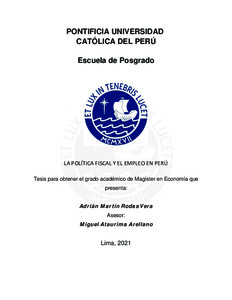| dc.contributor.advisor | Ataurima Arellano, Miguel | |
| dc.contributor.author | Rodas Vera, Adrián Martín | |
| dc.date.accessioned | 2022-03-05T02:01:43Z | |
| dc.date.available | 2022-03-05T02:01:43Z | |
| dc.date.created | 2021 | |
| dc.date.issued | 2022-03-04 | |
| dc.identifier.uri | http://hdl.handle.net/20.500.12404/21752 | |
| dc.description.abstract | En el presente documento se evalúa la hipótesis de que la política fiscal puede fomentar la creación
de empleo en Perú. Esta investigación toma relevancia en el contexto económico actual,
caracterizado por un elevado nivel de desempleo y elevado déficit fiscal, en el que es requerido
adoptar una combinación óptima de ingresos y gastos del sector público que permita fomentar la
recuperación de la economía y la creación de empleos, a la vez que reestablezcan las fortalezas de
las finanzas públicas. Se desarrolla un modelo estructural de vectores autorregresivos (SVAR) con
datos trimestrales para el periodo entre el 2007-I hasta el 2021-II, adoptando el enfoque propuesto
por Blanchard y Perotti (2002), que establece restricciones institucionales en el que los choques de
gasto no pueden reaccionar a otros choques en el mismo trimestre, y se propone el uso de la Ley de
Okun como esquema de identificación de los choques del empleo. Los resultados obtenidos con los
datos disponibles y supuestos adoptados muestran evidencia a favor de la hipótesis de investigación.
Entre los principales hallazgos destacan que un incremento de 1% del gasto está asociado a un
incremento del PBI y del empleo de 0.208% y 0.341%, respectivamente; un incremento del gasto
público de S/ 1 millón puede genera hasta 78 empleos; y según tipo de gasto, un incremento de la
inversión pública de S/ 1 millón puede crear hasta 112 empleos, mientras que un incremento en la
misma magnitud del gasto corriente puede crear 73 empleos. Ello refleja que la inversión pública es
el tipo de gasto más efectivo en la creación de puestos de trabajo, lo cual se explicaría por el mayor
efecto multiplicador que genera sobre la economía. | es_ES |
| dc.description.abstract | This document assesses the hypothesis that fiscal policy can promote job creation in Peru. This
research takes relevance in the current economic context, characterized by a high level of
unemployment and a high fiscal deficit, in which it is necessary to adopt an optimal combination of
public sector income and expenses that allows promoting the recovery of the economy and job
creation, while reestablishing the strengths of public finances. A structural model of autoregressive
vectors (SVAR) is developed with quarterly data for the period from 2007-I to 2021-II, adopting the
approach proposed by Blanchard and Perotti (2002), which establishes institutional restrictions in
which the shocks of spending cannot react to other shocks in the same quarter, and it is proposed to
use Okun's Law as a scheme for identifying employment shocks. The results obtained with the
available data and the assumptions adopted show evidence in favor of the research hypothesis.
Among the main findings are that a 1% increase in spending is associated with an increase in GDP
and employment of 0.208% and 0.341%, respectively; an increase in public spending of S/ 1 million
can generate up to 78 jobs; according to the type of expenditure, an increase in public investment of
S/ 1 million can create up to 112 jobs, while an increase of the same magnitude in current spending
can create 73. This reflects that public investment is the most effective type of expenditure in creating
jobs, which would be explained by the greater multiplier effect it generates on the economy. | es_ES |
| dc.language.iso | spa | es_ES |
| dc.publisher | Pontificia Universidad Católica del Perú | es_ES |
| dc.rights | info:eu-repo/semantics/openAccess | es_ES |
| dc.rights | Atribución 2.5 Perú | * |
| dc.rights.uri | http://creativecommons.org/licenses/by/2.5/pe/ | * |
| dc.subject | Política fiscal--Perú | es_ES |
| dc.subject | Política de empleo--Perú | es_ES |
| dc.subject | Gastos públicos--Perú | es_ES |
| dc.subject | Inversiones públicas--Perú | es_ES |
| dc.title | La política fiscal y el empleo en Perú | es_ES |
| dc.type | info:eu-repo/semantics/masterThesis | es_ES |
| thesis.degree.name | Maestro en Economía | es_ES |
| thesis.degree.level | Maestría | es_ES |
| thesis.degree.grantor | Pontificia Universidad Católica del Perú. Escuela de Posgrado. | es_ES |
| thesis.degree.discipline | Economía | es_ES |
| renati.advisor.dni | 10600688 | |
| renati.advisor.orcid | https://orcid.org/0000-0001-8599-403X | es_ES |
| renati.author.dni | 42912966 | |
| renati.discipline | 311317 | es_ES |
| renati.juror | Maravi Meneses, Cristian Adderly | es_ES |
| renati.juror | Ataurima Arellano, Miguel | es_ES |
| renati.juror | Lengua Lafosse, Gloria Patricia | es_ES |
| renati.level | https://purl.org/pe-repo/renati/level#maestro | es_ES |
| renati.type | https://purl.org/pe-repo/renati/type#tesis | es_ES |
| dc.publisher.country | PE | es_ES |
| dc.subject.ocde | https://purl.org/pe-repo/ocde/ford#5.02.01 | es_ES |






